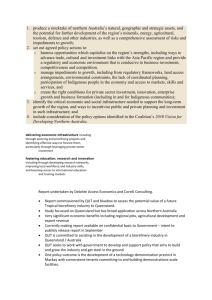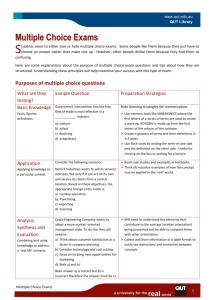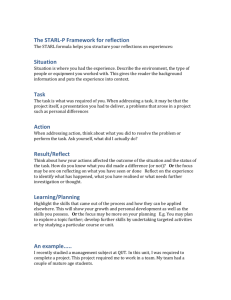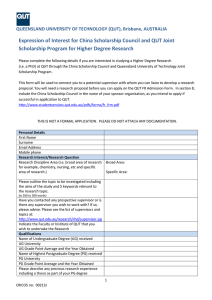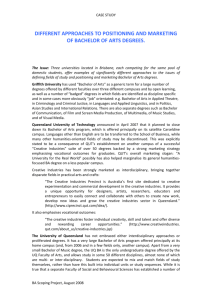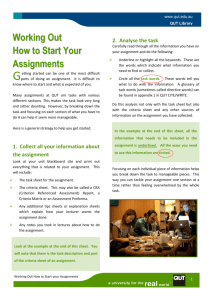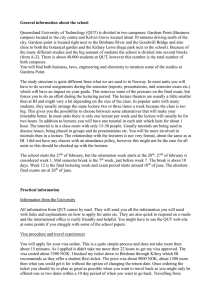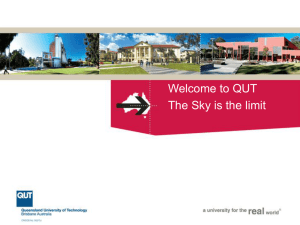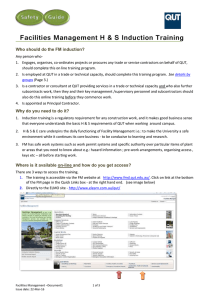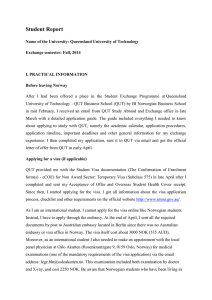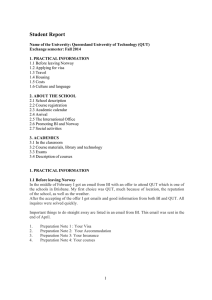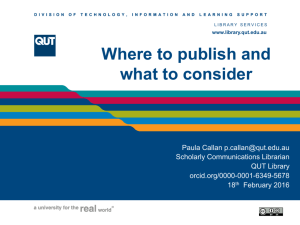QUT - Fall 2012 (II) - BI Norwegian Business School
advertisement
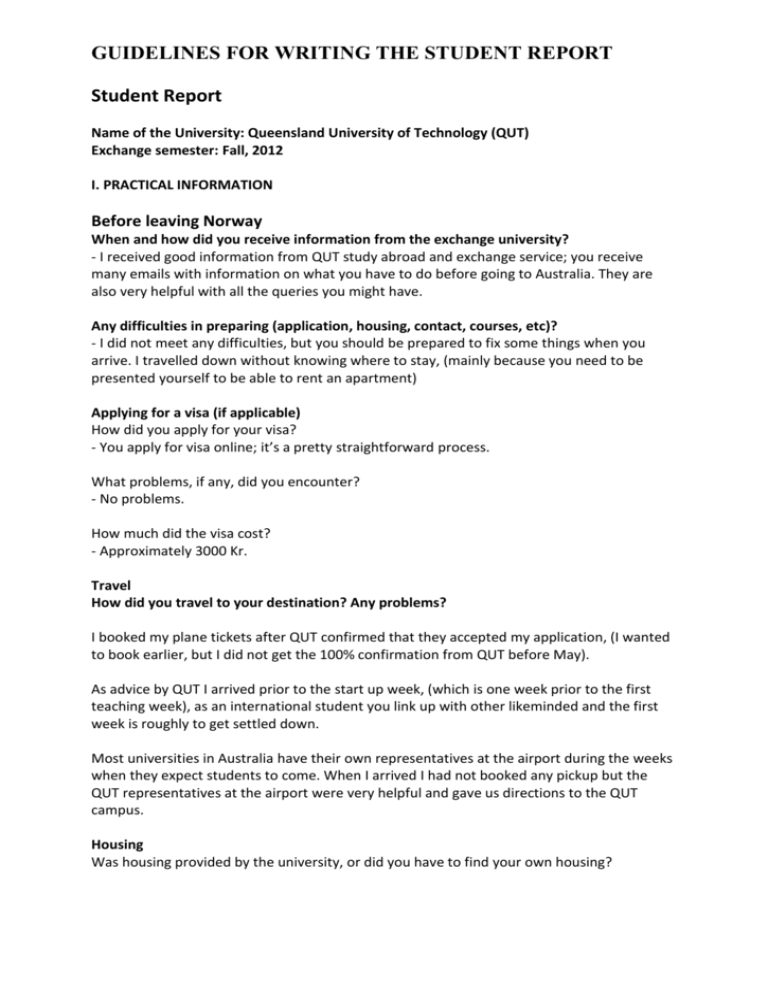
GUIDELINES FOR WRITING THE STUDENT REPORT Student Report Name of the University: Queensland University of Technology (QUT) Exchange semester: Fall, 2012 I. PRACTICAL INFORMATION Before leaving Norway When and how did you receive information from the exchange university? - I received good information from QUT study abroad and exchange service; you receive many emails with information on what you have to do before going to Australia. They are also very helpful with all the queries you might have. Any difficulties in preparing (application, housing, contact, courses, etc)? - I did not meet any difficulties, but you should be prepared to fix some things when you arrive. I travelled down without knowing where to stay, (mainly because you need to be presented yourself to be able to rent an apartment) Applying for a visa (if applicable) How did you apply for your visa? - You apply for visa online; it’s a pretty straightforward process. What problems, if any, did you encounter? - No problems. How much did the visa cost? - Approximately 3000 Kr. Travel How did you travel to your destination? Any problems? I booked my plane tickets after QUT confirmed that they accepted my application, (I wanted to book earlier, but I did not get the 100% confirmation from QUT before May). As advice by QUT I arrived prior to the start up week, (which is one week prior to the first teaching week), as an international student you link up with other likeminded and the first week is roughly to get settled down. Most universities in Australia have their own representatives at the airport during the weeks when they expect students to come. When I arrived I had not booked any pickup but the QUT representatives at the airport were very helpful and gave us directions to the QUT campus. Housing Was housing provided by the university, or did you have to find your own housing? GUIDELINES FOR WRITING THE STUDENT REPORT QUT does not have student accommodations, but they have an accommodation service which helps you with finding a place to stay. The help they can provide for you is showing you around to possible accommodations. Since I arrived one week prior to the start of the semester, most of the accommodations were already taken, so I would recommend you maybe to travel down a little earlier. But some good tips too keep in mind: - Some of the people showing you around give you pretty bad deals. - Check out Urbanest: http://www.urbanest.com.au/home/accommodation/brisbane.aspx - Most of the deals in Australia Brisbane are minimum 6 months lease. Costs - Approximately how much per month did you spend on rent, books, food, transportation, and other personal expenses? Rent Books Food Transport Other NOK 9000 NOK 1000 NOK 4000 NOK 600 NOK Culture and language Did you have any language problems with the faculty or other students? - Some of the units had lecturers and tutors from overseas, which I found difficult to understand at times. How were the possibilities to experience the country and the culture? - Australia is an expensive country, but there are a lot of possibilities to travel around. You can easily go to the airport and take a weekend in Sydney or Melbourne, you can even go to New Zealand, train and busses are also good ways to travel. Cultural and social effects from the exchange experience How do you think the exchange experience will affect you from a cultural and social point of view? - I think that the exchange experience have given me a wider perspective, while on exchange I have also got friends from other parts of the world not only students from Australia. How do you think the exchange experience influences your future career possibilities? - I think it is very positive for the future career possibilities, that was one of the main reasons for me to go abroad, and I am positive that it will have a good influence on my career! II. ABOUT THE SCHOOL Please describe: GUIDELINES FOR WRITING THE STUDENT REPORT School and surroundings: QUT is located in the Brisbane city, near the river, and close to a botanic garden. You can also easy walk to the south bank beach just across the river. Current faculty divisions and special areas: Approx. number of students (graduate and undergraduate) and number of exchange students: QUT have about 42 000 Students, from where 28 000 is full time. About 6000 are students from overseas. Study structure: The structure varies from course to course, but mainly the structure is based on lectures mostly 2-3 hours, and then a one-hour tutorial to go deeper into the lecture materials. The final grade is calculated from mainly three parts. A mid term exam, a written assignment and then the final exam (this varies from course to course). Course registration Were you able to register for courses before arrival? - Yes, you receive a username and a password, which you can use to log in to the students web site. And from there you can register. If not, when did you register? Any difficulties? - I enrolled all my units when I arrived, I choose to use the first week to attend 8-10 different units, so I could “taste” the unit before I totally committed to it. When and how long was the period for adding/dropping courses? - One week Academic calendar Arrival date: First day of the semester: Last day of classes: Examination period: Any special events/holidays: Other: 12 July 23 July 26 October 3 – 17 November 24 – 28 September The International Office QUT have an international office which provides good information in English, and are also prepared to help you with almost everything you need. Social activities How was your relationship with native students? - Good, I made some friends in some units, but as an exchange student you spend most of the time with other exchange students. GUIDELINES FOR WRITING THE STUDENT REPORT How was the relationship among the exchange students? - The relationship is good, of course it depends on how much you get involved. Is there a student organization, and if so, are the exchange students a part of it? - There are many organizations, but I did not participate in any of them. Are there any special activities and gatherings for exchange students? - Yes, there is. The international office have some gatherings in the first week that is good to take part in. there you can meet up and get to know fellow students. III. ACADEMICS In the classroom Describe the teaching style. - The lectures are pretty similar to BI. You have one lecture that lectures the course material, and then you have tutorials, where you go deeper into the material. Language of instruction? Any problems? - The language is of course English, but many of the lectures and tutors are from Asia, and therefore their accent can be difficult to understand. How would you evaluate the level of study in relationship to the level at BI? / How is the workload compared to that at BI? - It depends, many students who studies abroad, choose courses that are not to difficult, and then the level is “lower” but if you choose courses from where you can learn I think the work rate is the same. But I would say that the quality at BI is a little higher. Is the teaching primarily practical or theoretical? - Mostly theoretical. Did professors use cases, group work or lectures (or a combination)? - In some of the units cases and group work was used! Describe the relationship between professors and students. - Good, they really want you to understand and learn. They have consultation times, and answer you mails if you have questions. Describe the relationship between the students in the classroom. - It depends on how big the class is, In 50% of my units we had really good relations in the classroom. Course materials Describe the course materials used (books/literature, online articles, Powerpoint, etc). - All the units have different books on the book list, I did not use all of them, because the PowerPoint provided was good enough. In some of the units we also used relevant articles. GUIDELINES FOR WRITING THE STUDENT REPORT In which language were the course materials? - English How do you estimate the level of the course materials in comparison to BI? - Some of the books and articles were really good. Were materials used for detailed knowledge or a broad overview of a subject? - The books was very detailed, which gave you the opportunity to gain detailed information. Me personally like to get the broad overview and then go deeper into some subjects. Exams Was the exam based on the course materials or on the lectures? - Lectures How was the course evaluated (include all that apply)? - Mainly the evaluation came in three parts: Mid-term exam, written assignment, and the final exam. - But some of the units had quizzes in addition, and also participation in classes was used in one unit. Library and technology Do students have easy access to the library and its resources? - Yes Were computers provided around campus/in the library? - Yes How is technology used in teaching or to distribute information? - Mainly they use PowerPoint and the white board. So there is room for some improvements here. Description of courses Please list below all the courses you took while on exchange, including as many details as possible. Your comments are extremely useful for BI and for future exchange students, include information on the level of difficulty, relevance to your studies, if the course was practical/theoretical, any enrolment issues, etc. Course code & name Example:FIN123 Finance EFB 240 Finance for International Business EFB 307 Finance 2 MGB 309 Strategic Management Master/ Bachelor Bachelor Exam form Prerequisites None Bachelor 4-hour written exam 2 - Hour Bachelor Bachelor 2 - Hour 2 - Hour EFB210 (BSB119 or CTB119) or BSB116, and (BSB113 or CTB113) or (BSB123 or BSB122 or CTB122) MGB200, MGB211, CTB211, MGB222, or CTB232 Approved as Elective Comments GUIDELINES FOR WRITING THE STUDENT REPORT MGB 340 International Business in the Asia Pacific Bachelor 2 - Hour MGB225, IBB205, IBB217, or IBB208 I had to find two courses that was similar to two of the units at BI (Strategy and Finance) therefor the two units Finance 2 and Strategic management was the two units that I had to take abroad. When I was choosing the other two units I tried to find some units that could be relevant to my exchange stay in Australia, therefor I found International Business in the Asia Pacific very relevant, and Finance for International Business was also a fun unit to have. One advice to give: if you find a unit that you would like to have, but there are some prerequisites that you don’t have. You can easily argue with the administration at the business school and tell them that you won’t have problem with taking the course.
